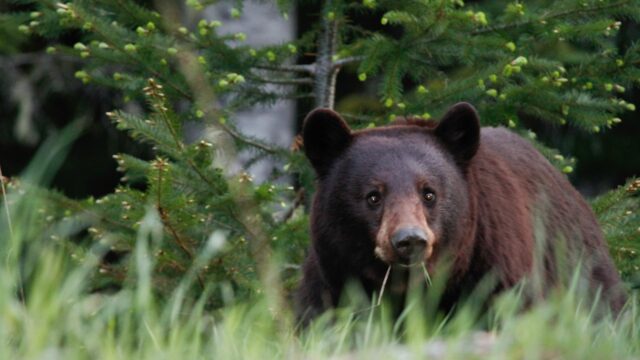Yesterday, in an announcement covering changes to provincial forestry policy, the B.C. government signaled a shift away from prioritizing timber over biodiversity and ecosystems in B.C.’s forestry laws by announcing the removal of the ‘unduly’ clause from the Forest Practices and Planning Regulation under the Forest and Range Practices Act. We welcome the removal of the clause and hope B.C. ensures similar language is removed from all regulations and replaced with language prioritizing biodiversity conservation and ecosystem health.
The intent of this clause was to ensure that setting aside land for protecting species and habitat could not ‘unduly reduce the supply of timber.’ Government policy indicated that the reduction could not exceed even one percent of the short and long-term timber supply. Simply put, the clause ensured that biodiversity protection could not get in the way of logging, even if the logging took place in threatened ecosystems such as big-treed old growth forests.
Ecojustice and our ENGO partners have been advocating for the removal of this clause for decades as a small but key step to prevent unsustainable logging practices which destroy critical ecosystems that are home to several ‘at-risk’ species. Ecojustice and Wilderness Committee’s 2021 B.C. Biodiversity Report Card recommended the removal of this clause and outlined the rapid decline of several at-risk species like the spotted owl, caribou, marbled murrelet and more, due to unsustainable logging practices and poor legal protections.
While getting rid of this clause is a commendable interim step toward dismantling the timber bias in B.C.’s forest management regime, it is not the whole solution. The solution rests in the paradigm shift outlined in the 14 recommendations of the Old Growth Strategic Review (OGSR), which sets out a new approach to forest management that prioritizes ecosystem health. During yesterday’s announcement, B.C. reaffirmed their commitment to rapid implementation of those recommendations, but we need to see more urgent action in the coming months. This includes moving quickly and transparently to defer all logging within the 2.6 million hectares of most at-risk old growth identified by the Technical Advisory Panel, and prioritizing development of a new, overarching biodiversity and ecosystem health law as set out in recommendation two of the OGSR.
Sarah Korpan, Legislative Affairs Specialist, Ecojustice said the following in response to today’s announcement:
“For decades, B.C. has put biodiversity on the backburner. This neglect has been enabled by provincial laws that treat forests as a resource to be managed solely for their economic value. Yesterday’s announcement is a welcome shift away from the status quo, but we also need to move beyond just amending language in existing laws if we are to achieve the paradigm shift needed to meaningfully protect and restore valuable ecosystems. The second recommendation of the Old Growth Strategic Review clearly outlines the need for government to work with First Nations to co-develop a new law that prioritizes biodiversity and ecosystem health in all government decision-making across all sectors. We hope B.C. will prioritize developing that new law while continuing to implement critical interim measures for protecting ecosystems.”
About
Ecojustice uses the power of the law to defend nature, combat climate change, and fight for a healthy environment. Its strategic, public interest lawsuits and advocacy lead to precedent-setting court decisions, law, and policy that deliver lasting solutions to Canada’s most urgent environmental problems. As Canada’s largest environmental law charity, Ecojustice operates offices in Vancouver, Calgary, Toronto, Ottawa, and Halifax.


